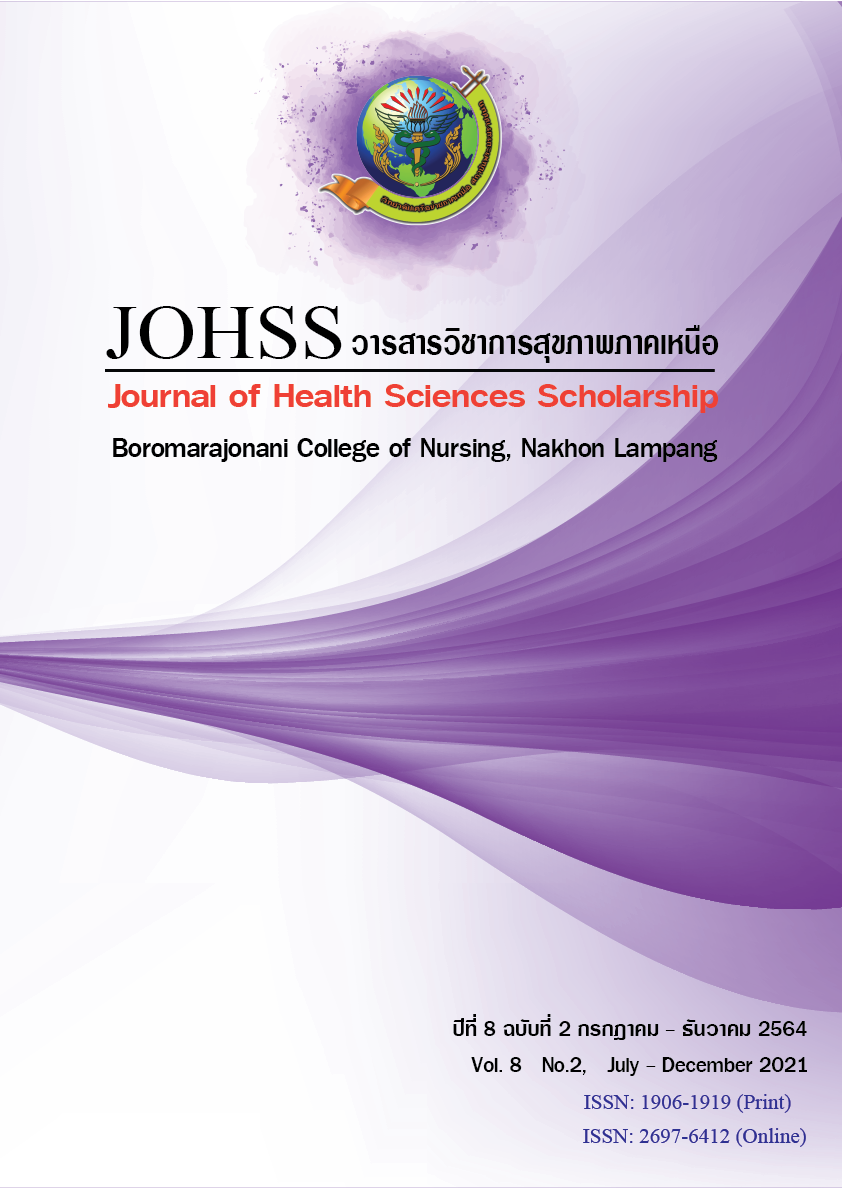ปัจจัยที่สัมพันธ์กับการรับรู้การทำหน้าที่ด้านการรู้คิดในผู้ป่วยมะเร็งลำไส้ใหญ่และไส้ตรงที่ได้รับยาเคมีบำบัด
คำสำคัญ:
มะเร็งลำไส้ใหญ่และไส้ตรง, ยาเคมีบำบัด, การทำหน้าที่ด้านการรู้คิดบทคัดย่อ
การศึกษาครั้งนี้มีวัตถุประสงค์เพื่อศึกษาความสัมพันธ์ระหว่าง ขนาดยาเคมีบำบัด ความวิตกกังวลและอาการซึมเศร้ากับการรับรู้การทำหน้าที่ด้านการรู้คิด โดยใช้แนวคิดการเปลี่ยนแปลงการทำหน้าที่ด้านการรู้คิดจากการรักษาโรคมะเร็งของ Hess และ Insel (2007) เป็นกรอบแนวคิดในการศึกษา เลือกกลุ่มตัวอย่างแบบสะดวกตามคุณสมบัติที่กำหนดคือกลุ่มผู้ป่วยโรคมะเร็งลำไส้ใหญ่และไส้ตรงที่เข้ารับการรักษาด้วยยาเคมีบำบัดในจังหวัดลำปาง จำนวน 65 ราย เครื่องมือที่ใช้เก็บข้อมูล ได้แก่ แบบบันทึกข้อมูลส่วนบุคคล แบบสอบถามความวิตกกังวลและอาการซึมเศร้า (Thai HADS) และแบบสอบถามการทำหน้าที่ด้านการรู้คิดในผู้ป่วยมะเร็งที่ได้รับการรักษา (FACT-Cog Version 3) วิเคราะห์ข้อมูลโดยสถิติบรรยาย สถิติสหสัมพันธ์แบบเพียร์สันและสเปียร์แมน
ผลการศึกษาพบว่ากลุ่มตัวอย่างมีค่าเฉลี่ยการรับรู้ความบกพร่องของการทำหน้าที่ด้านการรู้คิดในระดับเล็กน้อย ( = 98.85 , SD = 10.34) การวิเคราะห์ความสัมพันธ์พบว่าความวิตกกังวล อาการซึมเศร้า และขนาดยาเคมีบำบัด มีความสัมพันธ์ทางลบกับการรับรู้การทำหน้าที่ด้านการรู้คิดอย่างมีนัยสำคัญทางสถิติ (r = -.47, p < .01, r = -.49, p < .01 และ r = -.42, p < .05 ตามลำดับ)
ผลการศึกษาครั้งนี้เป็นข้อมูลพื้นฐานที่ช่วยให้พยาบาลและทีมสุขภาพได้ตระหนักเห็นความสำคัญของการประเมินการทำหน้าที่ด้านการรู้คิดในกลุ่มผู้ป่วยมะเร็งลำไส้ใหญ่และไส้ตรง รวมทั้งการวางแผนการพยาบาลเพื่อลดปัจจัยที่เกี่ยวข้องกับการเกิดความบกพร่องการทำหน้าที่ด้านการรู้คิดในผู้ป่วยมะเร็งลำไส้ใหญ่และไส้ตรงที่ได้รับยาเคมีบำบัดได้อย่างมีประสิทธิภาพ
เอกสารอ้างอิง
Ahles, T. A., & Saykin, A. (2007). Candidate mechanism for chemotherapy-induced cognitive change. Nature Reviews Cancer, 7(3), 192-201.
Arunpongpaisal, S., Chaiudomsom, K., & Virasiri, S. (2016). Depression Disorder in Chaiudomsom Khon Kaen: klungnana vitthaya press.
Bender, C. M., & Thelen, B. D. (2013). Cancer and cognitive changes: The complexity of the problem. Seminars in Oncology Nursing, 29(4). 232-237.
Boykoff, N., Moieni, M., Karen, S., & Subramanian, S. K. (2009). Confronting chemobrain: an in-depth look at survivors’ reports of impact on work, social network, and health care response. Journal of Cancer Survivorship, (3), 223-232.
Chengtawee, P. (2013). colon & chemotherapy. Retrieved from https://med.mahidol.ac.th/ cancer_center/th/article/coloncancer (in Thai).
Dhillon, H. M., Tannock, I. F., Gregory R. P., Corrinne R., Sean, B. R., & Vardy, J. L. (2018). Perceived cognitive impairment in people with colorectal cancer who do and do not receive chemotherapy. Journal of Cancer Survivorship, 12, 178 – 185.
Diane, V., Kathleen, M., Russel, Storniolo, A. M., janet, S., & Carpenter, M. (2009). Cognitive dysfunction and it relationship it quality of life in breast cancer patient. Oncology Nursing Forum, 36(6), 326-334.
Falleti, M. G., Sanfilipo, A., Maruff, P., Weih, L., & Phillips, K. A. (2005). The nature and severity of cognitive impairment associated with adjuvant chemotherapy in women with breast cancer: a meta-analysis of the current literature. Brain Cognition, 59, 1905-1913.
Fardell, J. E., Vardy, J., Johnston, I. N., & Winocur, G. (2011). Chemotherapy and cognitive impairment: Treatment Options. Clinical Pharmacology and therapeutics, 90(3), 336-376.
Ferguson, R. J., Riggs, R., Ahles, T., & Saykin, A. J. (2018). Management of Chemotherapy-Related Cognitive Dysfunction. In Feuerstein, M. & Nekhlyudov, L. (Eds.), Handbook of Cancer Survivorship. (2nd ed). AG: Springer International Publishing.
Han, R., Yang, Y. M., Dietrich, J., Luebke, A., Mayer-Proschel, M., & Noble, M. (2008). Systemic 5-fluorouracil treatment causes a syndrome of delayed myelin destruction in the central nervous system. Journal of Biology, 7(12). 12.1-12.22.
Hess, L. M., & Insel, K. C. (2007). Chemotherapy-related change in cognitive function: a conceptual model. Oncology Nursing Forum, 34(5), 981-994.
Hubjaroen, S. (2014). Nursing care of colorectal cancer patients treated with Chemotherapy. In Boonpipattanapong, T., & Wannawong, S. (Eds.). State-of-the-art: standard of care for colorectal cancer.
Songkhla: Book unit, Faculty of Medicine, PSU.
Koteprom, J., Pongthavornkamol, K., Chareonkitkarn, V., & Soparattanapaisarn, N. (2013). Factors Influencing Perceived Cognitive Functioning in Breast Cancer Patients Receiving Adjuvant Chemotherapy. Nursing Science Journal of Thailand, 31(2), 17-26.
Merriman, J. D., Ah, D. V., Miaskowski, C., & Aouizerat, E. (2013). Proposed mechanisms for cancer and treatment related cognitive change. Seminars in Oncology Nursing, 29(4). 260-267.
Mehnert, A., Scherwath, A., Schirmer, L., Schleimer, B., Petersen, C., Schulz-Kindermann, F., et al. (2007). The association between neuropsychological impairment, self-perceived cognitive deficits, fatigue & health related quality of life in breast cancer survivors following standard adjuvant versus high-dose chemotherapy. Patient Education & Counseling, 66, 108-118.
Mitchell, T., & Turton, P. (2011). 'Chemobrain' : Concentration and memory effects in people receiving chemotherapy - a descriptive phenomenological study. European Journal of Cancer Care, 20, 539-548.
Moon, S., Kim, S., & Kim, M. (2011). Perceived cognitive function and related factors in korean women with breast cancer. Asian Nursing Research, 5(2), 141-150.
Myers. J. S. (2013). Cancer and chemotherapy related cognitive change: the patient experience. Seminars in Oncology Nursing, 29(4). 300-307.
National Cancer Institute. (2015). Colorectal Cancer guideline. Bangkok: Kosit Press. (in Thai).
National Cancer Institute. (2019). Hospital-based cancer registration 2018. Bangkok: New Thammada press. (in Thai).
Nilchaikovit, T., Lortrakul, M., & Phisansuthideth, U. (1996). Development of Thai version of Hospital Anxiety and Depression Scale in cancer patients. Journal of the Psychiatrist Association of Thailand, 41(1), 18-30.
Polat, U., Arpaci, A., Demir, S., Erdal, S., & Yalcin, S. (2014). Evaluation of quality of life and anxiety and depression levels in patients receiving chemotherapy for colorectal cancer: impact of patient education before treatment initiation. Journal of Gastrointestinal Oncology, 5(4), 270-275.
Saniah, A. R., Zainal, N. Z. (2010). Anxiety, depression and coping strategies in breast cancer patients on chemotherapy. Malaysian Journal of Phychiatry Ejournal, 19(2). 32-46. Retrieved from http://www.mjpsychiatry.org/index.php/mjp/article/view/99
Vardy, J. N., Dhillon, H. M., Pond, G. R., Rourke, S. B., Bekele, T., Dodd, R.A., et al. (2015). Cognitive function in patients with colorectal cancer who do and do not receive chemotherapy: A prospective, longitudinal, controlled study. Journal of Clinical Oncology, 33(34). 4085-4092.
Vardy, J., Wefel, J. S., Ahles, T., Tannock, I. F., & Schagen, S. B. (2008). Cancer and cancer-therapy related cognitive dysfunction: an international perspective from the Venice cognitive workshop. Annals of Oncology, 19, 623-629.
Von Ah, D., Haberman, B., Carpenter, J. S., & Schneider, B. L. (2013). Impact of perceived cognitive impairment in breast cancer survivors. European Journal of Oncology Nursing, 17(2), 236-241.
Wefel, J. S., Lenzi, R., Theriault, R. T., Davis, R. N., & Meyers, C. A. (2004). The cognitive sequelae of standard-dose adjuvant chemotherapy in women with breast carcinoma: Result of a prospective, randomized, longitudinal trial. Cancer, 100(11), 2292-2299.
Wigmore, P. M., Mustafa, S., El-Beltagy, M., Lyons, L., Umka, J., & Bennett, G. (2010). Effects of 5-FU. In Raffa, R. B. & Tallarida, R. J. (Eds.), Chemo fog: Cancer chemotherapy-related cognitive impairment (pp. 157-164). (Online). From: http://www.springer.com/us/book/9781441963055.
ดาวน์โหลด
เผยแพร่แล้ว
ฉบับ
ประเภทบทความ
สัญญาอนุญาต
ลิขสิทธิ์ (c) 2021 วารสารวิชาการสุขภาพภาคเหนือ

อนุญาตภายใต้เงื่อนไข Creative Commons Attribution-NonCommercial-NoDerivatives 4.0 International License.
บทความ ข้อมูล เนื้อหา รูปภาพ ฯลฯ ที่ได้รับการตีพิมพ์ในวารสารวารสารวิชาการสุขภาพภาคเหนือ ถือเป็นลิขสิทธิ์ของวารสารวารสารวิชาการสุขภาพภาคเหนือ หากบุคคลหรือหน่วยงานใดต้องการนำทั้งหมดหรือส่วนหนึ่งส่วนใดไปเผยแพร่ต่อหรือเพื่อกระทำการใดๆ จะต้องได้รับอนุญาตเป็นลายลักอักษรจากวารสารวารสารวิชาการสุขภาพภาคเหนือก่อนเท่านั้น
เนื้อหาและข้อมูลในบทความที่ลงตีพิมพ์ในวารสารวิชาการสุขภาพภาคเหนือถือเป็นข้อคิดเห็นและความรับผิดชอบของผู้เขียนบทความโดยตรงซึ่งกองบรรณาธิการวารสาร ไม่จำเป็นต้องเห็นด้วย หรือร่วมรับผิดชอบใดๆ
อนึ่ง ข้อความและข้อคิดเห็นต่างๆ เป็นของผู้เขียนบทความนั้นๆ ไม่ถือเป็นความเห็นของวารสารฯ และวารสารฯ ไม่จำเป็นต้องเห็นด้วยกับข้อความและข้อคิดเห็นใดๆ ของผู้เขียน วารสารฯ ขอสงวนสิทธิ์ในการพิจารณาตีพิมพ์ตามความเหมาะสม รวมทั้งการตรวจทานแก้ไขหรือขัดเกลาภาษาให้ถูกต้องตามเกณฑ์ที่กำหนด



